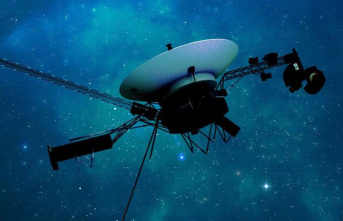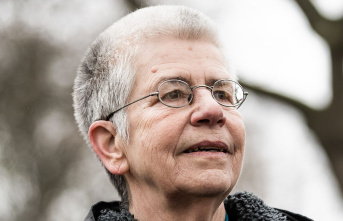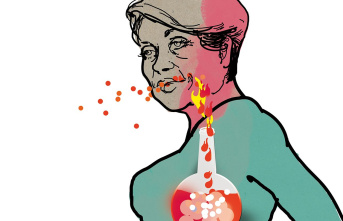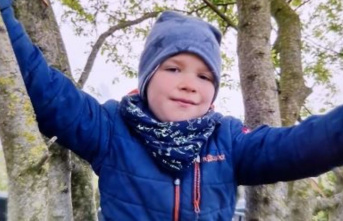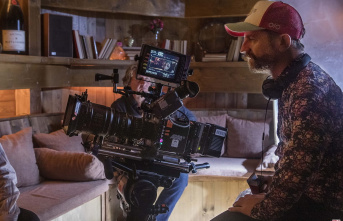The film De Gaulle is back in cinemas on June 22, 2020. During its first release, Lambert Wilson confided in his work to interpret the general. Interview.
[Updated June 22, 2020 8:30 AM] Few actors could have been believable in such a commanding role. Lambert Wilson was the only French actor who had the stature according to director Gabriel Le Bomin. In De Gaulle, again on display this Monday, June 22 after a first outing on March 4 (before confinement to, he lends his features to the general during the few crucial weeks which led to the appeal of June 18, 1940. This biopic combines historical facts and the intimate life of the De Gaulle couple in order to identify the motivations behind the commitment of the military and political man, encouraged by his wife Yvonne. During an interview carried out before the first release of the film last March , Lambert Wilson returned to the way he had taken on this role, which no other actor had embodied in a biopic dedicated to the cinema until then.
What was your reaction when you were asked to play Charles de Gaulle?
When you are offered De Gaulle, you say to yourself both "it's great" and at the same time "beware, there was Abbé Pierre, Cousteau, it is perhaps a little dangerous to chain the such famous French figures". But what made me want to make the film was the photography on the first page of the screenplay: we saw the couple Charles and Yvonne de Gaulle in 1940. (Pause) And even before reading the screenplay, I looked at the photograph for a long time, and they had this tenderness, something that convinced me, even before reading the detail. It's an exciting storyline because it's a mix of the intimate and the historical. But it was above all the torque and the romantic aspect that convinced me. There was something unusual in this photograph, in the way they both looked at each other. I said to myself "that changes everything": it's not the old gentleman with the trembling voice who embodies France, not at all! He is a man who will fight, who is visionary, intelligent but totally alone in the face of events, supported by an incredible woman. It was very different.
No, and if I had been offered a traditional biopic, I would have run off. I did it with Cousteau [dans L'Odyssée en 2016, ndlr], which is not totally a biopic either, but which made cross 40 years in the life of this man. It imposes difficult things. Is it really necessary to see a man's whole life? I think it's much more relevant with this film to choose a month that will reveal a lot of things about who he was and what this couple was.
I haven't tried to imitate it because I don't find it a very interesting exercise. The perfect imitation is entertaining for a while, but you can miss the point. I find it's more important to give a feeling, a vibration of the character and to make understand what moves him, why he makes the decision he makes, how he reacts emotionally and psychically to the world around him. The imitators - of which I am not one because I am unable to imitate anyone - very often change their subject of imitation because once we have done de Gaulle for five minutes, even to perfection, the public needs something else. And what does he need? depth of character. Otherwise, to find how to embody it, it was very traditional: we consume photos, images, films, we listen to documents, we eat de Gaulle, we drink de Gaulle, we sleep de Gaulle...
I hope there is pressure to play each role! If there is no pressure, there is a problem, there has to be pressure... Honestly, there is more pressure on a director who is going to write a subject on de Gaulle and who is going to deliver a de Gaulle, on a producer who must defend a film on de Gaulle, than on the actor who interprets him.
Yes I had 2.5 hours of pure prosthetic make-up… (Thinks) in all I had about 3.5 hours of preparation.
I like it because it's like a mask. A mask can be too congealing, too fixed, you can "die" behind the mask. But it also allows you to release your inhibitions. We are not ourselves at that moment, we see ourselves in the mirror and that creates a different walk, a different voice, simply because we have a different face. What I also found fascinating was the companionship with the make-up artists, the hairdresser,...: they are there every morning for two months to build you millimeter by millimeter, who are attentive to the smallest details and who monitor. It's as if we weren't alone in composing the character, it's really a team effort. It's more pleasant than working alone.
It was the last day of filming, the production had brought in a lot of people, people were listening to me next to the sets, there was a kind of really impressive staging… But it was a bit like figure skating where we have imposed figures: there, it is the speech, everyone is waiting for it. To play it, I had in my ear the speech he made on June 21, since that of June 18 was not recorded. I was immersed in this concentration, this sound, these sentences. When you're in uniform, in front of the microphone that was probably his at the BBC, in this kind of isolation, it's much easier to get closer to him. Where it was much more difficult was when de Gaulle was dressed in civilian clothes, because he is mostly defined by his military costume. And when he was in civilian clothes, I felt that he was leaving... It was much more difficult to keep this de Gaulle when he is a citizen like the others.
Where it's complicated in the intimate scenes is that we have to make decisions where there is no information at all, except for the letters, their correspondence, what their son described as family situation and the atmosphere that reigned there, etc. But at some point, how does de Gaulle take his wife's hand? How does he kiss her goodbye? How does he kiss her when he finds her? We have responsibilities, if not to family members, we are still obligated not to do anything. And at the same time you have to be imaginative, invent their body language.
It's very easy, it's total happiness. It happens, that's all. We don't have discussions. Isabelle is in direct contact with the emotion and the situation, I just have to look at her to believe it. She plays in such a sincere and natural way, that we forget the wigs. We knew each other well and we liked each other, it helps yes, we didn't have to discover each other during the shooting.
Firstly because it hasn't been done before, so it had to be done. But also because I think it's not bad to hear a message whose virtue is to bring people together in a common effort, a common direction. But this is not the project of the film, it is one of its effects! We find ourselves in a time when everyone in France tends to hate each other and slap each other in the face, we are in a kind of phase of disenchantment with each other. And with the film, it's good to hear the words of a man who only has that left: the power of words. We feel that he does not do it politically, to win in a selfish way, he does it truly for an altruistic question, a question bigger than him. We are a little disappointed by politics at the moment, there is always a bad surprise that comes out of a hat, we always say to ourselves "people do a little nonsense". In the film, we have a guy who is totally heroic. Perhaps in spite of himself, because events make him the only one. So there it goes.
First published on March 4, 2020 when De Gaulle was first released, this interview was re-shared when the film returned to theaters on June 22, 2020.
De Gaulle - again in cinema releases on June 22, 2020
8


